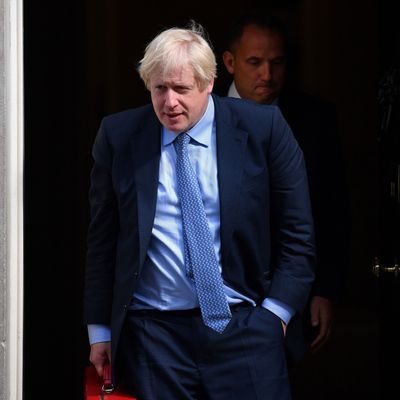
Boris Johnson is not excelling at his job. The right-wing populist (and nihilist) had a plan to succeed where his predecessor had failed and remove Britain from the European Union come hell or high gas prices. With the U.K. scheduled to crash out of the E.U. on October 31, the prime minister would force his parliamentary opponents to spend much of the preceding month on an unrequested vacation. Specifically, Johnson asked the queen to suspend Parliament for the five weeks between September 12 and October 14. This would leave lawmakers little time to pass legislation forbidding a “no deal” Brexit. And by preserving the threat of a “hard Brexit” — which Johnson supports over yet another delay — his bargaining position during final negotiations with Brussels in mid-October would be strengthened, and a better divorce agreement would be secured. Johnson’s premiership would begin in triumph.
This plan ran into a few hiccups. Johnson’s power grab alienated many within his own party, and a wave of defections cost his government its majority. Meanwhile, just as pressure makes diamonds, so a limited legislative calendar made for efficient lawmaking: Parliament’s anti–no-deal Brexit majority passed a law prohibiting Johnson from taking that route in short order. As these events unfolded, the prime minister took the extraordinary step of asking Parliament to dissolve his own government, so that a snap election might provide him with the hard-line pro-Brexit majority he lacked. But Johnson proved so paradoxically weak, he couldn’t even persuade Parliament to vote against him. All this left the prime minister at the head of a zombie government, with no mandate from the people’s representatives, and no leverage over the E.U.
And then, on Tuesday, the British Supreme Court took a sledgehammer to what remained of Johnson’s legitimacy: In a historic 11-0 ruling, the U.K.’s high court found the prime minister’s suspension of Parliament “was unlawful because it had the effect of frustrating or preventing the ability of Parliament to carry out its constitutional functions without reasonable justification.” As such, “the prime minister’s advice to Her Majesty was unlawful, void and of no effect.”
John Bercow, the Conservative-aligned speaker of the House of Commons — who attained a measure of international fame in recent weeks for his spirited recitations of the word “order” and his stunning rebuke of Johnson’s suspension of Parliament — called for Britain’s lawmakers to promptly reassemble.
Bercow praised the court’s judges for vindicating “the right and duty of Parliament to meet at this crucial time to scrutinize the executive and hold ministers to account,” before declaring, “As the embodiment of our parliamentary democracy, the House of Commons must convene without delay. To this end, I will now consult the party leaders as a matter of urgency.”
The court’s ruling was by no means a foregone conclusion. Britain has neither a written constitution nor America’s tradition of judicial review. Thus, it was far from clear that the Supreme Court even had the authority to rule on Johnson’s alleged abuse of one of his office’s accepted powers. A lower court had previously ruled that the judiciary had no say over suspensions of Parliament. And while some observers expected the high court to rule against Johnson, few imagined that its decision would be unanimous.
Johnson expressed his displeasure at the ruling Tuesday, while nevertheless vowing to honor it.
The practical effect of the court’s ruling is uncertain. After all, Parliament did already find time to tie Johnson’s hands before departing. And to this point, merely adding days to Parliament’s calendar has done little to resolve the body’s intractable divisions over Brexit.
Still, the ruling renders Johnson’s initial Brexit strategy an impressively comprehensive — and comprehensively humiliating — failure. Which seems inauspicious for the prime minister going forward.






























